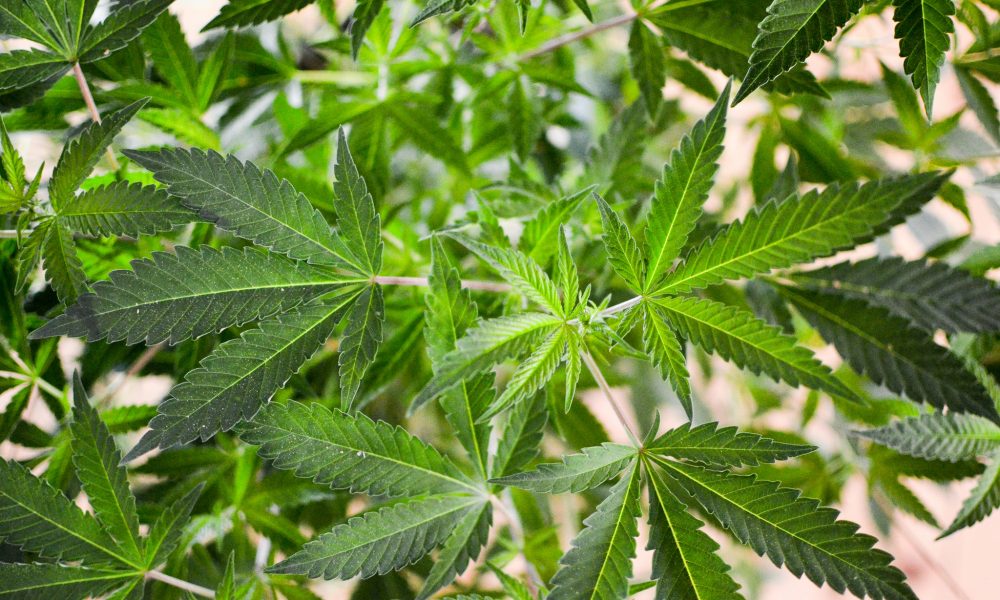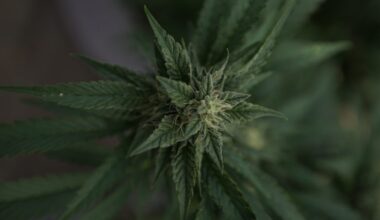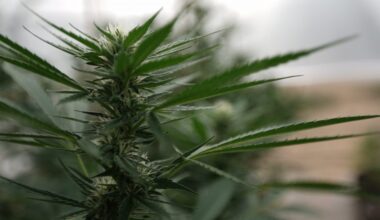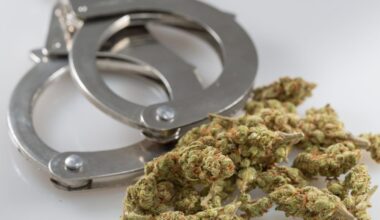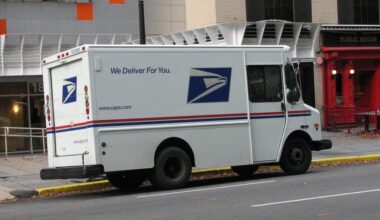Washington, D.C. voters are strongly in favor of proposals to broadly decriminalize drugs and establish harm reduction centers, a new poll found.
One week after activists announced an effort to pressure local lawmakers enact the reforms, a coalition of activists group organized under the banner of DecrimPovertyDC released a survey showing just how popular the policy changes are among D.C. residents. It also found that voters would be more likely to elect local legislators who embrace decriminalization.
At a top level, 83 percent of respondents said that they favor having the D.C. Council pass an ordinance to “remove criminal penalties for possession of small amounts of commonly-used controlled substances consistent with personal use.” That includes 65 percent who strongly support the far-reaching reform.
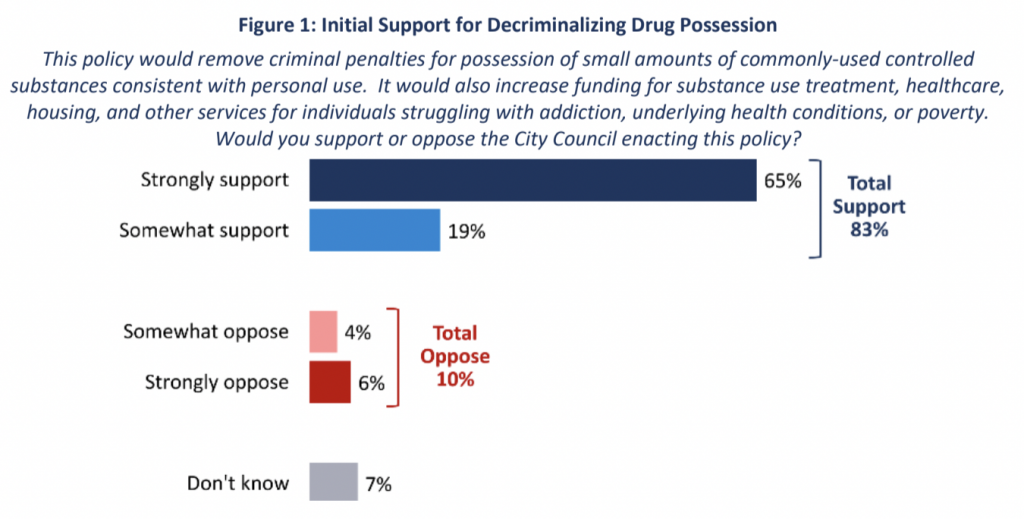
Via FM3.
The prompt also asked participants whether they support increased funding for “substance use treatment, healthcare, housing, and other services for individuals struggling with addiction, underlying health conditions, or poverty.”
That’s good news for advocates who recently launched a campaign to urge local lawmakers to broadly decriminalize drugs, with a focus on expanding treatment resources and harm reduction services.
DecrimPovertyDC—a coalition of advocacy groups like the Drug Policy Alliance (DPA) and Students for Sensible Drug Policy—is imploring the District Council to take up the cause, and members have already met with the offices of each legislator and have gotten a generally positive reception.
“Our calls to D.C. Council to introduce and advance #DecrimPovertyDC’s bill proposal is rooted in urgency and support from community members who are also convinced that the drug war has done more harm than good,” Queen Adesuyi, policy manager for DPA’s Office of National Affairs, told Marijuana Moment. “Washingtonians are genuinely ready for D.C. Council to explore ending arrests for drug use and possession, along with building out a public health infrastructure that could support Washingtonians who need and want help.”
Our bill proposal is massively supported by D.C. voters and DC’s communities hardest hit by the drug war. @councilofdc, the time is now to end arresting people for drugs and invest in health & harm reduction. Learn more here: https://t.co/dKd3lesFgU https://t.co/IPGzNm96LY
— #DecrimPovertyDC (@decrimpovertydc) October 26, 2021
“Washingtonians can see for themselves that the drug war is worsening public safety and health,” she said. “We are determined to push D.C. Council to listen to their constituents who largely want to see an actual investment in policies and resources rooted in evidence-based, health services instead of punishment and stigma.”
The new poll, conducted by FM3 Research, looked at public opinion on a wide range of issues the coalition is backing. Support was widespread, and 72 percent of respondents said they would be more likely to vote for councilmembers who embraced the reforms.
After the various pros and cons of decriminalization were explained to respondents, support dipped slightly, but 77 percent still said they back the policy change.
“Even after an exchange of positive and critical messaging, our decriminalization proposal still maintained support from three-quarters of Washingtonians,” Adesuyi said. “We have more than enough support amongst Washingtonian voters to lead a ballot campaign, however, we chose to go down a legislative path because we wanted to ensure that we can fund the public health and harm reduction infrastructure that we need to replace our current criminalization model.”
Given that support for decriminalization in the activist-driven poll dipped a bit after respondents were read opposition arguments, it’s not clear how much impact a well-funded campaign to maintain criminalization could have on efforts to convince Council members to go through with the reform.
“Though decriminalizing personal use quantities of drugs is not radical, and is simply an urgently needed next step in dismantling the harmful drug war, for some people, it challenges decades of socialization of fear and drug propaganda,” Adesuyi said. “However, the public health emergency that we are facing due to prohibition and drug war policies is clear enough that even people who still are working through their drug stigma associated to certain substances believe that our proposal is a path worth exploring because the status quo has been so deadly.”
#DecrimPovertyDC released polling data where 72% of DC voters said they are more likely to vote for a candidate who supports drug decriminalization. @councilofdc, your constituents want more public health services, not criminal penalties. It’s time to #DecriminalizeDrugs. pic.twitter.com/rCYT7dyavA
— #DecrimPovertyDC (@decrimpovertydc) October 26, 2021
Participants in the survey were also asked to weigh in on each specific policy proposal that DecrimPovertyDC is pushing for. Majorities favored all of them.
For example, 95 percent said that they support providing “additional funding to connect individuals suffering from addiction, health problems, and needs relating to poverty to services like healthcare and substance use disorder treatment.”
Ninety-three percent said that they back establishing “24/7 centers to provide harm reduction, health, and overdose prevention services to people who use drugs.”
While that’s in line with what advocates are proposing, it doesn’t specifically talk about creating safe injection sites—an option that would be made available to legislators if the group’s draft legislation is enacted. That particular component of harm reduction centers could prove more controversial.
Additionally, 86 percent of respondents said they’re in favor of having an advisory board create “criminal penalties for small amounts of drugs for personal use.” Another 84 percent said they would like to see a government-funded study into cost savings from decriminalization that could then be reinvested into harm reduction programs.
“Washington, D.C. voters are strongly in favor of the City Council decriminalizing possession of personal-use amounts of controlled substances and investing in outreach and treatment services for addiction and related health disorders,” the polling memo says. “This support cuts broadly across all major demographic groups—including 50% of conservatives—and that support remains sold after an exchange of pros and cons. Voters are also broadly in favor of all specific aspects of the policy, including outreach services and 24/7 harm-reduction centers.”
The poll, which has a margin of error of +/-4.9%, involved online and telephone interviews with 402 likely November 2022 voters, and was conducted June 30 – July 8 of this year.
Under the group’s proposal, the mayor would be required to establish a harm reduction center where people could receive treatment resources and access sterile needles. The legislation allows for the creation of a safe consumption site within the center where people could use illicit drugs in a medically supervised environment.
That could prove challenging, however, as the U.S. Supreme Court recently rejected a request to hear a case on the legality of establishing safe injection sites where people can use illicit drugs in a medically supervised environment. An attempt to create such a facility in Philadelphia was blocked under the Trump administration and is now pending further action in a lower federal court.
The D.C. campaign, which is also being supported by AIDS United, Defund MPD, Honoring Individual Power and Strength (HIPS) and dozens of other groups, would also make it so the health department would need to provide a drug testing service so people could screen products for contaminants or other hazardous compounds.
Another provision activists are pushing for would work to repair the harms of criminalization, in part by requiring the courts to “identify and vacate convictions for offenses decriminalized by this bill.” They would also need to find and vacate cases related to drug paraphernalia, which was decriminalized last year under separate legislation.
At this point, the drug decriminalization measure has not been introduced in the D.C. Council, but activists are encouraged by early conversations with local lawmakers. The intent is to build on drug policy progress such as paraphernalia decriminalization, which was championed by key players like the chairman of the Council’s Judiciary Committee.
D.C. voters approved a ballot measure to decriminalize psychedelics last November.
The push in the nation’s capital follows advocates’ success in advancing decriminalization in other parts of the country.
Oregon voters approved a historic initiative to decriminalize drug possession last year, and multiple jurisdictions across the U.S. are now exploring similar policy changes.
Last month, Massachusetts lawmakers heard testimony on separate proposals to decriminalize drug possession and establish a pilot program for safe injection facilities. A safe consumption site bill advanced through a legislative committee in the state in May.
The Maine Senate this summer defeated a bill that would have decriminalized possession of all currently illicit drugs.
Rhode Island’s governor signed a bill in July to create a pilot program legalizing safe consumption sites.
Congressionally, a first-of-its-kind bill to decriminalize drug possession at the federal level was introduced this session.
There’s a sense of urgency to get this reform in D.C. enacted, as the coronavirus pandemic has seemed to contribute to record-high drug overdose deaths in the country. Adesuyi said “the last year really has made it so we just can’t wait any more.”
Meanwhile, advocates have renewed hope that D.C. could soon move to legalize the sale of adult-use marijuana.
The District has been prevented from doing so despite legalizing cannabis in 2014 because it’s been bound by a congressional spending bill rider prohibiting the use of local tax dollars for that purpose. But with majorities in both chambers this session, Democratic appropriators have excluded that prohibitive language from the most recent spending measures—so D.C. would be empowered to finally enact a regulated market if that legislation is enacted as written.
The mayor of D.C. said in April that local officials are prepared to move forward with implementing a legal system of recreational marijuana sales in the nation’s capital just as soon as they can get over the final “hurdle” of congressional interference.
Mayor Muriel Bowser (D) introduced a cannabis commerce bill in February—and members of the District Council are considering that, as well as a separate proposal put forward by Chairman Phil Mendelson (D).
A hearing on the latter bill is scheduled for next month the Committee of the Whole, the Committee on the Judiciary & Public Safety & the Committee on Business & Economic Development.
Separately, a D.C.-based psychedelics organization also recently issued about $50,000 in its first round of grants for various community groups to support efforts to educate and organize people around plant medicine.
Read the full D.C. drug decriminalization polling memo below:
Medical Disclaimer:
The information provided in these blog posts is intended for general informational and educational purposes only. It is not a substitute for professional medical advice, diagnosis, or treatment. Always seek the advice of your physician or other qualified healthcare provider with any questions you may have regarding a medical condition. The use of any information provided in these blog posts is solely at your own risk. The authors and the website do not recommend or endorse any specific products, treatments, or procedures mentioned. Reliance on any information in these blog posts is solely at your own discretion.
